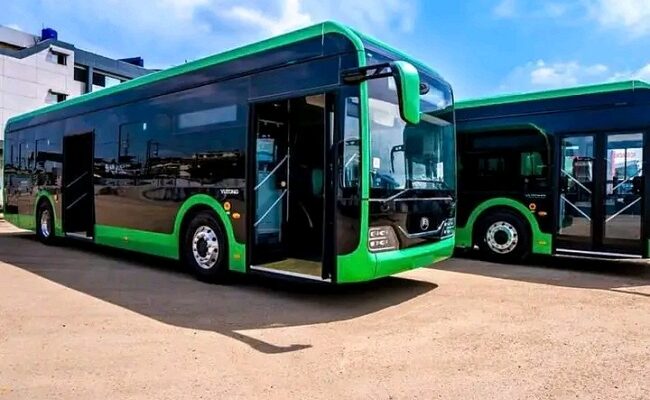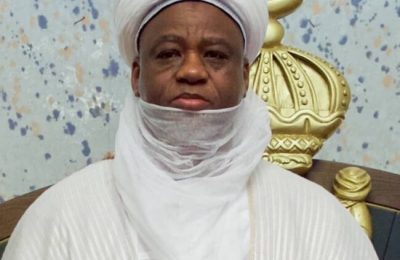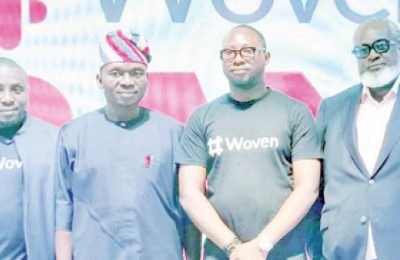On Sunday, April 30, the Lagos State government announced the launch of a number of electric buses into its public transportation fleet; the first of its kind by a government in Nigeria.
This is what the governor of Lagos State, Babajide Sanwo-Olu, wrote on Twitter about it. “I am excited to announce the first set of electric buses in the Lagos Mass Transit Master Plan as part of our increased effort to modernise every sector of Lagos. Thanks to our partnership with @Oando_PLC, Lagosians can expect a cleaner and greener public transportation system.
“With the ability to travel 280km at full charge, taking into account our unique travel times in Lagos, our electric buses are a game-changer. With an average daily usage of 200km by existing BRTs, there is no need to fear that the buses can stop while in transit.

“Our new electric buses will not only reduce carbon emissions but will also increase efficiency. This means that Lagosians can say goodbye to high fuel costs and hello to cost-efficient transportation. We shall be running a pilot scheme over the next few months to gather sufficient data required to analyse the operational efficiencies relative to the current BRT buses to further improve our public transport service.
“We understand the need for charging stations to power our electric buses, which is why we are partnering with Oando Clean Energy Limited to strategically place Universal Chargers at public places like malls and gas stations. We also plan to establish an Assembly Plant for Electric Buses in the near future.”
The genesis

On Thursday, April 28, 2022, Oando Clean Energy Limited (OCEL) and Lagos Metropolitan Area Transport Authority (LAMATA) signed a Memorandum of Understanding (MoU) to enable the successful deployment of an Electric Vehicle (EV) infrastructure ecosystem that would include electric buses, charging stations and other supporting infrastructure towards the attainment of a sustainable road transport system in Lagos State.
OCEL partnered Yutong Bus Co Limited to produce the electric buses equipped with air conditioning and Wi-Fi.
On April 25, 2023, OCEL, in a statement, announced that it had taken delivery of the electric mass transit buses “that will kick off the Proof of Concept phase of our Sustainable Transport Initiative.”
OECL said the company’s strategic vision is to decarbonize the transport system in Nigeria. “Over the next seven years, and through the rollout of over 12,000 buses, this initiative will transition the current combustion mass transit buses to electric, starting in Lagos State and eventually across the country.
“In the medium to long term, and in line with our ambitions, our efforts within sustainable transport will lead to improved air quality, enhanced public health, enable the employment of at least 3,000 new drivers and an additional 2,000 workers to support bus maintenance, depot management, as well as estimated economic cost savings of US$2.6bn (3.6% of Lagos’s GDP).”
The chairman of OCEL, Adewale Tinubu, said: “The arrival of our electric mass transit buses and development of an EV infrastructure ecosystem is a reminder that the only way to remain ahead of the curve is by being unafraid to break new ground and consistently looking for opportunities to leapfrog. Furthermore, this project underscores the African saying, ‘If you want to go fast, go alone; if you want to go far, go together.’
“Public-Private Partnerships have been critical to getting the project to this point and will continue to fuel our expansion across the entire country. I must commend the collaborative efforts of the Lagos State Government through LAMATA in seeing this project through.
“The commencement of this project gives us a platform to showcase to other states what is possible and open the door for engagements on bespoke solutions to suit their local needs as well as act as a model to be adopted by other organizations looking to venture into sustainable transportation.”
Electric mobility on the global scene
Electric bus registrations are picking up around the world, with nearly 66,000 sold in 2022, the International Energy Agency (IEA) has noted.
China continues to dominate the market with about 80 percent of all global sales last year.
“Electric vehicles are one of the driving forces in the new global energy economy that is rapidly emerging – and they are bringing about a historic transformation of the car manufacturing industry worldwide,” said IEA Executive Director Fatih Birol.
“The trends we are witnessing have significant implications for global oil demand. The internal combustion engine has gone unrivalled for over a century, but electric vehicles are changing the status quo. By 2030, they will avoid the need for at least 5 million barrels a day of oil. Cars are just the first wave: electric buses and trucks will follow soon.”
‘The best way to transition to green transportation’
Tolulope Olukokun, CEO of ThinkBikes, a micro-mobility company that manufactures electric two- and three-wheelers for last mile transportation, had this to say about the launch of electric buses in Lagos. “This is a positive move by the industry and I hope it goes around the states.
“There are a lot of advantages associated with it: the cost of transportation will be lower. The buses will create more jobs. The buses do not depend on fuel availability. So people can still travel when there is fuel scarcity. It will also reduce carbon emissions.
“We should not shy away from electrifying our transport sector. This is just the beginning and in a few years, time it will be the only thing. So let’s get started this way.”
He noted that “If we really want to transition to green transportation quickly, one of the best ways is through public transportation. If we have mass transit that is electrified, it will help a number of us stay sustainable. It is not mass transportation alone but micro mobility like electric bicycles for cargo, as well as passengers, such as what ThinkBikes is doing.”
Olukokun added that according to Africa New Energy and Electric Vehicle (AfricaNEV), “an organisation which I belong, to we should electrify public transport first before going private. This is not a compulsory order but considering the costs and the people that can afford it, there will be more impacts if we have public vehicles than private electric vehicles.”
Olukokun allayed fears of the performance of electric buses in the hectic traffic Lagos is known for. “I heard people saying that if you’re stuck in traffic, the battery can run down. This is a gross misconception.”
Olukokun explained that the vehicle uses an electric motor. “Therefore, there is no consumption of energy when the vehicle is stationary, except for the air-conditioning and info-tainment systems whose energy consumptions are also not major; also headlamps in case it is night time.”
“One thing that could hinder the project is maintenance,” said Byencit Duncan, Senior Associate Research and Lead E-mobility Portfolio, at Clean Technology Hub, Nigeria.
“We know that in Nigeria, we are very low on maintenance. If those charging stations and buses are well maintained, the project is going to last.”
As fuel subsidy removal looms
Fuel subsidy removal has been on the table for at least two federal government administrations. It remains in the offing for the administration scheduled for inauguration in about a fortnight on May 29.
Last year August, the incoming President of Kenya, William Ruto, announced the removal of fuel subsidy in his inaugural address.
The people of Kenya felt the immediate effect as fuel and transportation costs spiked.
However, John Msingo, Chief Revenue Officer for EVChaja, a company that installs, operates and maintains electric vehicle charging infrastructure in Kenya, said his country would fare better when funds used for subsidy are deployed to other areas of development.
He said, Nigeria, just like Kenya, could deploy its foreign exchange to the development of renewable energy sources. This, he said, would make the country less dependent on foreign countries and the variations in international oil prices and the subsequent cost of imported petrol.
Msingo, who is also the East African moderator of AfricaNEV, a non-profit whose aim is to accelerate the adoption of electric mobility in the continent, added that “the potential savings from operating electric buses are huge.”
“Power is generally moving to a distributed model. If the state gets electric buses the next question for them will be how to power them. This opens up interesting options to the government like public private partnership using a mix of different renewable sources.
Msingo described the move by Lagos State as “a step in the right direction, and a very forward-thinking move that should be emulated by governments on the continent.”







